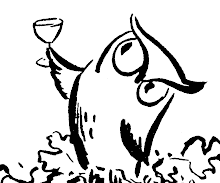
This post is a direct answer to the one made by Tom in his blog, called “The Phantom American” which you should read here: http://orneryworld.blogspot.com/2009/09/toms-america-phantom-american.html before reading this one. Tom recommended to me the book "Planet Simpson which I will present here.
Part I The book in general
Planet Simpson, written by Chris Turner is a book that covers all things Simpsons-related, and that means, as I´ve come to understand, nearly everything. Here you can find in-depth knowledge about the staff behind the series, the predecessors it evolved from, the dramaturgical techniques employed and the worldview of the makers, especially that of Matt Groening. Now, that was the part to be expected by reading the title.
Besides that, the author covers the culture the series is embedded in, that is, the American culture since roughly 1990. He quite nicely explains such diverse topics as Punk, globalization, the ubiquitous irony, the flaws in modern democracy’s personnel and the omnipotence of today´s economical system. All in all, I must say, it´s a very good and recommendable book.

Part II What I have learned
It was quite amazing to be shown what amount of gags/references I didn´t get, because I didn´t live in America during the time the different seasons where aired and because I only watched the dubbed versions. For example, I didn´t know that the show was a direct rival of Cosby and so I didn´t get the Cosby-references. I didn´t know what shows the Fox-network aired besides the Simpsons and so I didn´t know that side blows against “Married…with children” was directed at Fox. I never heard such gags as
I´m Billy Corgan, Smashing Pumpkins.
I´m Homer Simpson, smiling politely.
because they are simply not translatable. Not to speak of the different celebrity speakers that appear on the Simpsons not as themselves, for example Michael Jackson.
What came as a mild shock though, was the fact (I have to take the author by his word here) that Homer Simpson is not only designed as a stand-in for the average American baby boomer, which I could have imagined, but that he is also regarded and loved as such by the American audience. I wouldn´t have expected the Americans to be that self-mocking. Even when I asked friends, what they regard homer Simpson to be, the answer closest to that was “the typical ill-educated American”.
What I could have imagined but never did before reading this book is, that the Simpsons are THE defining event for several generations. Where the 60´s had Woodstock, the 90´s and on have the Simpsons. And this event is much more defining for our age as nearly everyone has watched the Simpsons while very few people of the 60´s attended Woodstock.

Part III ontology
The reason the book was recommended to me was my question what the term “ontological policy”, used by Tom, should mean. The book itself never used that wording but it made several comparisons between a right-leaning political standpoint marked by a worldview of how things should be or are proclaimed to be (everyone can succeed if he tries hard enough…, the market is a good thing…, our system is just…) and the Simpsons´ way of showing how things really are (…unless born in the wrong place, …for the rich and unscrupulous, …a flawed one). It was especially entertaining getting to know the direct interaction between G.H.W. Bush and the Simpsons´crew.
Part IV the Phantom American
The centre point of Tom´s post was the notion of a Phantom American inside everyone of us. This Phantom American comes to life and is nurtured by the consumption of all things American. It is proclaimed to be the reason why anything coming from America will have some sort of relevance for us not living in the USA and why these things will change our worldview.
Besides the already-given critique over at Tom´s blog I would like to take a closer look on the concept of the Phantom American. It´s true that American products of all sorts, but especially in the area of films and music, are the most-influential on a world-wide scale. But the same concept, that you have to have a Phantom XXX (enter nationality here) in order to see relevance in the products of a given culture would have to be true for every culture you have contact with. And the number of these cultures is increasing rapidly, not least because of the internet. And as the number of this Phantom XXXs is increasing, so would the influences of different cultures. The result wouldn´t be an americanisation of the world but a world full of multi-schizophrenic people.
I´d say that a more appropriate description of the influences of different cultures would be like this: We face many different products originating from many different cultures. The relevance they have to us range from a negative one (we despise it, we see it as a bad influence and won´t “buy” it in every sense of the word) to a positive one (we want it, we change our behavior and/or worldview because of it). Besides these, there products that have no influence at all (because we don´t “get it”, we don´t see any relevance). Even the products that have a positive influence won´t create a Phantom XXX. I can get into zen-meditation without turning into a Japanese, not even part-time. I see it more in the way that you integrate some aspects of different cultures into your own personality, while clinging to the core principles of your own culture nonetheless.
